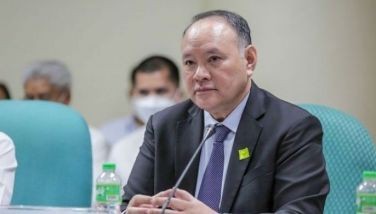House likely to pass watered-down version of anti-money launder bill
September 27, 2001 | 12:00am
The House of Representatives is likely to pass a watered-down version of the proposed Anti-Money Laundering Law.
Because of numerous objections to the P1-million benchmark amount for monitoring "suspicious" bank deposits, the majority and the minority agreed to raise the ceiling to at least P5 million.
Under the original version, any single deposit or series of it amounting to at least P1 million would be monitored and reported to the planned anti-money laundering task force since such funds could be tied to drug trafficking, kidnapping and other illegal activities.
Congressmen from both sides of the political fence felt that the benchmark was too low and could adversely affect middle- and high-income groups, such as businessmen and politicians.
Some unscrupulous bank officers could use the proposed law against the concealment of "dirty" money to harass and extort money from these groups, the congressmen reasoned out.
Thus, the majority and the minority agreed that the amount that would trigger the monitoring and reporting system be brought up to at least P5 million.
Some House members considered the P5 million still too low and were proposing P10 million.
Members of the minority conceded that the new draft, which was being written as of late yesterday afternoon, would be a "watered-down version."
They said the US version of the law sets a $10,000 single-transaction trigger for the monitoring and reporting mechanism.
"Our version would be more lenient than the US law," said Rep. Gilbert Remulla (LDP, Cavite).
Minority leader Carlos Padilla (LDP, Nueva Vizcaya) said the majority appeared bent on approving the proposed Anti-Money Laundering Law last night "by hook or by crook."
"They are rushing its approval even with its obvious flaws," he said.
Another opposition lawmaker, former Executive Secretary Ronaldo Zamora (PMP, San Juan), said Congress is enacting the anti-dirty money measure to placate the Financial Action Task Force.
FATF groups 29 progressive countries led by the US which are waging a global campaign against money laundering and the illegal activities from which such funds are derived.
It has set a Sept. 30 deadline for the Philippines to enact an anti-money laundering law and has threatened to recommend sanctions unless such legislation is in place by that time.
Because of numerous objections to the P1-million benchmark amount for monitoring "suspicious" bank deposits, the majority and the minority agreed to raise the ceiling to at least P5 million.
Under the original version, any single deposit or series of it amounting to at least P1 million would be monitored and reported to the planned anti-money laundering task force since such funds could be tied to drug trafficking, kidnapping and other illegal activities.
Congressmen from both sides of the political fence felt that the benchmark was too low and could adversely affect middle- and high-income groups, such as businessmen and politicians.
Some unscrupulous bank officers could use the proposed law against the concealment of "dirty" money to harass and extort money from these groups, the congressmen reasoned out.
Thus, the majority and the minority agreed that the amount that would trigger the monitoring and reporting system be brought up to at least P5 million.
Some House members considered the P5 million still too low and were proposing P10 million.
Members of the minority conceded that the new draft, which was being written as of late yesterday afternoon, would be a "watered-down version."
They said the US version of the law sets a $10,000 single-transaction trigger for the monitoring and reporting mechanism.
"Our version would be more lenient than the US law," said Rep. Gilbert Remulla (LDP, Cavite).
Minority leader Carlos Padilla (LDP, Nueva Vizcaya) said the majority appeared bent on approving the proposed Anti-Money Laundering Law last night "by hook or by crook."
"They are rushing its approval even with its obvious flaws," he said.
Another opposition lawmaker, former Executive Secretary Ronaldo Zamora (PMP, San Juan), said Congress is enacting the anti-dirty money measure to placate the Financial Action Task Force.
FATF groups 29 progressive countries led by the US which are waging a global campaign against money laundering and the illegal activities from which such funds are derived.
It has set a Sept. 30 deadline for the Philippines to enact an anti-money laundering law and has threatened to recommend sanctions unless such legislation is in place by that time.
BrandSpace Articles
<
>
- Latest
- Trending
Trending
Latest
Trending
Latest
Recommended






























